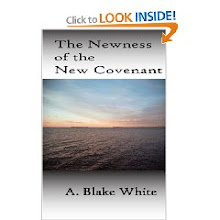 I remember it like it was yesterday. I was about eight or nine years old and my family just moved to a new town. It was Sunday, so we naturally began looking for a church. Being that my father was of the Calvinistic persuasion, he decided to visit a Presbyterian church. We had never been to any type of church but baptist. I refused to get out of the car claiming that, "I was baptist, not Presbyterian." I remember the day quite well. I was serious- as serious as an eight year old could be. But I really did not know why I was Baptist. I just knew that I did not want to be anything else.
I remember it like it was yesterday. I was about eight or nine years old and my family just moved to a new town. It was Sunday, so we naturally began looking for a church. Being that my father was of the Calvinistic persuasion, he decided to visit a Presbyterian church. We had never been to any type of church but baptist. I refused to get out of the car claiming that, "I was baptist, not Presbyterian." I remember the day quite well. I was serious- as serious as an eight year old could be. But I really did not know why I was Baptist. I just knew that I did not want to be anything else. Nettles quotes Bruce Shelley's description of evangelical. Shelley describes "evangelical" as "a spirit, a concern for sinners, a way of life. Its master motif is the salvation of souls, its guiding image the redemptive Gospel of Jesus Christ. All other considerations are subordinate to this standard" (xvii).
In other words, evangelical describes someone who is consumed, focused, even obsessed with the Gospel. It describes someone who is so thankful for what they have experienced in Christ that they desire others to experience the grace of salvation that they have experienced. More specifically, to be evangelical means that one adopts, supports, and teaches the doctrine of justification by faith. To fail in holding to this doctrine is to fail to truly understand the Gospel. Evangelicalism, therefore unashamedly affirms that faith alone justifies. It emphasizes the forgiveness of sins and the imputed righteousness of Christ alone.
Nettles puts it this way:
"The evangelical message asserts the uniqueness of Jesus Christ as the personal revelation of god, the completeness of his work in humiliation and exaltation for the redemption of sinners, the effectual working of the Holy Spirit through the preaching of the gospel, and the necessity of an uncoerced response to repentance and faith. The heart of evangelicalism throbs with the redeeming gospel of grace, expressed in missionary passion that outreaches in evangelism" (xvii).
I dealt with this very topic Sunday in Colossians 4:2-6- where the theme is Gospel centered ministry. I pointed out Christ's words to His disciples in John 15 when he predicts, "You will testify of me...because you have been with Me from the beginning". As evangelicals we testify of the Gospel of grace to others out of a very natural determination because we have been with Jesus and cannot help to have this evangelical passion.
For the record, the English word evangelical comes from a Greek word which refers to the publication of the Gospel. In short, to be evangelical is to proclaim the Biblical Gospel, which includes, by necessity, the doctrine of justification by faith.
Baptists, according to Nettles, have always been imbued with the spirit of evangelicalism. It is perhaps the main thing that characterizes them. In fact, Spurgeon, who is considered the giant of Baptist life was strongly Calvinistic. He broke away from the Baptist Union during the downgrade controversy of the 19th century over doctrinal laxity. It was Spurgeon who insisted evangelicalism was the key prerequisite of Christian fellowship:
"In our fellowship with Methodists of all grades we have fond them firmly adhering to those great evangelical doctrines for which we contend...We care far more for the central evangelical truths than we do for Calvinism as a system; but we believe that Calvinism has in it a conservative force which helps to hold men to the vital truth, and therefore we are sorry to see any quitting it who have once accepted it" (xix).
To Be Baptist Means to be Separate
Central to Baptist life down through history has been the affirmation that the church is made up only of regenerate (saved) believers. This is why Baptists immerse believers only. Baptism is really not the primary issue. Rather, salvation is. Baptism identifies someone as a child of God. And only truly saved children of God are part of the church. In other words, the church is not a mixed bag of believers and unbelievers. This is unique to Baptists.
In addition, to be separate means to understand a strict separation between church and state. The state is not to dabble with the church. And the church does not direct the state either.
Again, this last tenet brings us back to the Gospel centeredness of Baptists. In order to have a regenerate church membership the Gospel must be clearly delivered. Thus, Baptists are Gospel centered because they are separatistic in this sense.
Conclusion
Thus, Baptists could summarily be described as Gospel centered. This is seen in their orthodoxy, evangelicalism, and separatism. So next time someone asks you why you are Baptist, you can answer intelligently. I like acronyms. If it were not for acronyms I would have failed in school. An easy way to remember the Baptist identity is SOE- separate, orthodox, evangelical.








No comments:
Post a Comment